由if和unless引导的条件状语从句
Unit 6【刷语法】if、unless引导的条件状语从句(重点语法提升练)-九年级英语上册单元模
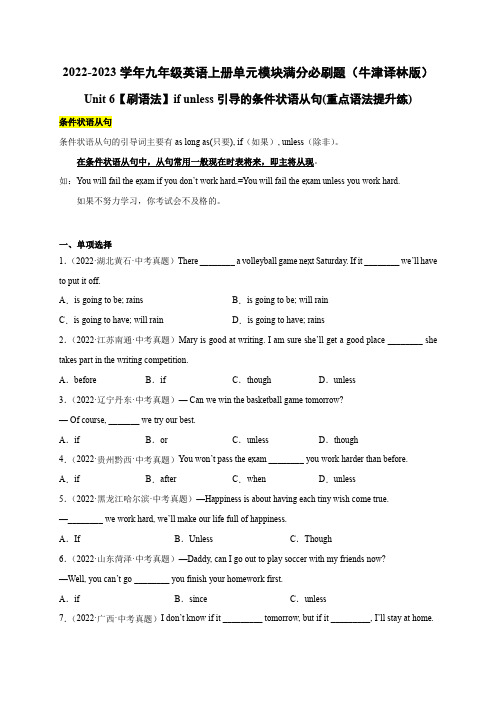
2022-2023学年九年级英语上册单元模块满分必刷题(牛津译林版)Unit 6【刷语法】if unless引导的条件状语从句(重点语法提升练)条件状语从句条件状语从句的引导词主要有as long as(只要), if(如果), unless(除非)。
在条件状语从句中,从句常用一般现在时表将来,即主将从现。
如:You will fail the exam if you don’t work hard.=You will fail the exam unless you work hard.如果不努力学习,你考试会不及格的。
一、单项选择1.(2022·湖北黄石·中考真题)There ________ a volleyball game next Saturday. If it ________ we’ll have to put it off.A.is going to be; rains B.is going to be; will rainC.is going to have; will rain D.is going to have; rains2.(2022·江苏南通·中考真题)Mary is good at writing. I am sure she’ll get a good place ________ she takes part in the writing competition.A.before B.if C.though D.unless3.(2022·辽宁丹东·中考真题)— Can we win the basketball game tomorrow?— Of course, _______ we try our best.A.if B.or C.unless D.though4.(2022·贵州黔西·中考真题)You won’t pass the exam ________ you work harder than before.A.if B.after C.when D.unless5.(2022·黑龙江哈尔滨·中考真题)—Happiness is about having each tiny wish come true.—________ we work hard, we’ll make our life full of happiness.A.If B.Unless C.Though6.(2022·山东菏泽·中考真题)—Daddy, can I go out to play soccer with my friends now?—Well, you can’t go ________ you finish your homework first.A.if B.since C.unless7.(2022·广西·中考真题)I don’t know if it _________ tomorrow, but if it _________, I’ll stay at home.A.will rain; rains B.will rain; will rain C.rains; will rain D.rains; rains 8.(2022·黑龙江齐齐哈尔·中考真题)Learning to write is learning to think. ________ , you won’t know things clearly.A.if you write them downB.unless you write them downC.if you won’t write them down9.(2022·广西贺州·中考真题)I won’t go to the movies this afternoon ________ I’m free.A.or B.unless C.because D.than10.(2022·江苏无锡·中考真题)You will not get the special gift ________ you finish all the tasks. A.after B.because C.while D.unless11.(2022·江苏泰州·中考真题)—It is impossible to finish the difficult task in such a short time on my own ________ both of us work together.—No problem. Let’s start!A.if B.but C.because D.unless12.(2022·河北·中考真题)________ you can use your dictionary, you will learn English better.A.If B.Unless C.Though D.Before13.(2022·安徽·中考真题)You won’t fully experience the culture of a foreign country ________ you go there in person.A.because B.unless C.as soon as D.as long as 14.(2022·四川达州·中考真题)The local government advises people ________ to other places ________ it is not necessary during the pandemic.A.travel; unless B.to not travel; if C.not to travel; unless D.not to travel; if 15.(2022·江苏·沛县教师发展中心模拟预测)The COVID-19 is still spreading rapidly. We’ll be at the risk of catching the virus ________ we get a vaccine(疫苗).A.if B.unless C.when D.whether16.(2022·江苏镇江·模拟预测)The museum will soon be open to the public ________ the checking work is done.A.but B.if C.while D.unless17.(2022·江苏宿迁·三模)We have a meeting every Monday morning ________ there is nothing to discuss.A.as B.unless C.since D.when18.(2022·江苏南通·模拟预测)Daniel will succeed in working out the Maths problem ________ he gives up.A.until B.unless C.because D.though19.(2022·内蒙古兴安盟·二模)—I think the environment is terrible these years.—Yes, it will be even worse ________ the government takes action to protect it.A.though B.when C.if D.unless20.(2022·内蒙古兴安盟·二模)—The weather report says that it ________ tomorrow in most parts of Harbin city.— If it ________, the school sports meet will be put off.A.will rain; will rain B.will rain; rainsC.rains; will rain D.rains; rains21.(2022·江苏·苏州市金阊实验中学校一模)No country is safe ________ all countries are safe. A.since B.although C.while D.unless22.(2022·江苏·射阳县第三中学一模)My brother is going to look for another job _______ the boss offers him more money.A.after B.when C.unless D.if23.(2022·江苏南京·二模)—We will go out for a picnic ________ it rains tomorrow.—You needn’t worry about the weather. It’s sunny tomorrow.A.until B.if C.unless D.when24.(2022·山东·无棣县教育科学研究中心二模)—Claudia, are you going to Jeff’s birthday party on Saturday?—Unless I ________.A.invited B.will be invited C.was inviting D.am invited 25.(2022·山东·阳信县教育科学研究中心一模)—Don’t worry about the final exam. You ________ it if you work hard.—Thanks!A.pass B.will pass C.passed D.have passed 26.(2022·安徽黄山·二模)— Let’s go cycling if it ________ fine this Sunday.— Sounds great. But nobody knows if it ________.A.is; rains B.is; will rain C.will be; rains D.will be; will rain 27.(2022·江西吉安·二模)There is no doubt that you ________ your dream come true if you keep on trying.A.make B.will make C.are making D.have made 28.(2022·黑龙江大庆·模拟预测)If you don’t go to the mountains tomorrow, ________.A.so will I B.neither will I C.neither do I29.(2022·西藏拉萨·二模)I wonder if he __________ time tomorrow. If he __________ free, I’ll invite him to give us a speech in our school.A.will have; is B.has; will be C.will have; will be D.has; is30.(2022·辽宁营口·一模)—Will you go to Daming’s birthday party?—I ________ if I ________.A.go; will be invited B.go; am invitedC.will go; am invited D.will go; will be invited二、用所给单词的正确形式填空31.(2022·江苏无锡·模拟预测)As long as you keep on practicing and never give up, you ________(succeed), I think.32.(2022·江苏·泰兴市济川初级中学模拟预测)They say the place may be polluted if some factories ________ (build) in the future.33.(2022·湖南·双牌县教育研究室一模)If it rains tomorrow, I ________ (stay) at home. 34.(2022·江苏·无锡市蠡园中学二模)My boss won’t allow me to have two days off unless my work ________ (complete) tomorrow.35.(2022·湖南省汉寿县教育研究室一模)I’ll go to work by car if it ________ (rain) tomorrow. 36.(2022·江苏无锡·一模)Dad says we will go camping this weekend if it _________(not be)rainy. 37.(2021·江苏常州·一模)—I think our country has done well in fighting with COVID-19.—I agree. The spread of COVID-19 can be prevented if right steps________ (take).38.(2020·江苏无锡·一模)There is no need to store more than enough rice if the government _______ (control) the price.39.(2020·江苏·常州市田家炳初级中学模拟预测)—Will Mary go to the fashion show on Sunday afternoon?—Of course she will if she_______ (choose) to be the host.三、完成句子40.(2022·江苏·星海实验中学二模)除非你赶时间,否则你可以坐地铁去那儿。
条件状语从句ifunless
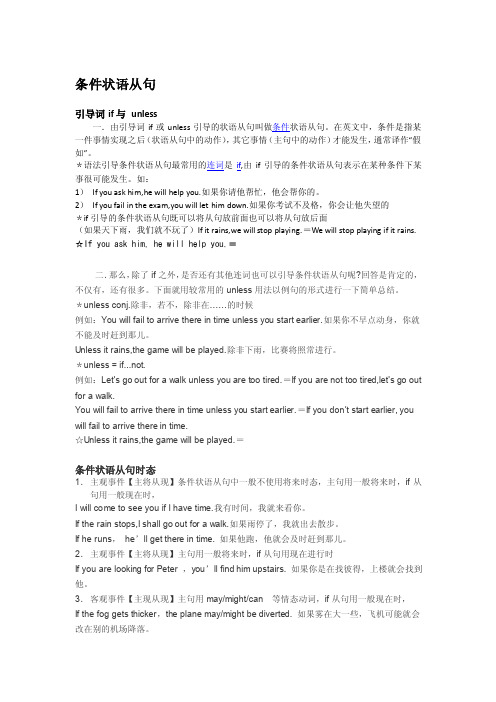
条件状语从句引导词if与unless一.由引导词if或unless引导的状语从句叫做条件状语从句。
在英文中,条件是指某一件事情实现之后(状语从句中的动作),其它事情(主句中的动作)才能发生,通常译作“假如”。
*语法引导条件状语从句最常用的连词是if,由if引导的条件状语从句表示在某种条件下某事很可能发生。
如:1)If you ask him,he will help you.如果你请他帮忙,他会帮你的。
2)If you fail in the exam,you will let him down.如果你考试不及格,你会让他失望的*if引导的条件状语从句既可以将从句放前面也可以将从句放后面(如果天下雨,我们就不玩了)If it rains,we will stop playing.=We will stop playing if it rains.☆If you ask him, he will help you.=二.那么,除了if之外,是否还有其他连词也可以引导条件状语从句呢?回答是肯定的,不仅有,还有很多。
下面就用较常用的unless用法以例句的形式进行一下简单总结。
*unless conj.除非,若不,除非在……的时候例如:You will fail to arrive there in time unless you start earlier.如果你不早点动身,你就不能及时赶到那儿。
Unless it rains,the game will be played.除非下雨,比赛将照常进行。
*unless = if...not.例如:Let's go out for a walk unless you are too tired.=If you are not too tired,let's go out for a walk.You will fail to arrive there in time unless you start earlier.=If you don’t start earlier, you will fail to arrive there in time.☆Unless it rains,the game will be played.=条件状语从句时态1.主观事件【主将从现】条件状语从句中一般不使用将来时态,主句用一般将来时,if从句用一般现在时,I will come to see you if I have time.我有时间,我就来看你。
初中英语知识点总结:条件状语从句

引导条件状语从句的连接词主要有:if(如果)、unless(除非)或as long as(只要)等。
unless在意思上等于if...not。
一、条件状语从句用法1、引导条件状语从句最常用的连词是if,由if引导的条件状语从句表示在某种条件下某事很可能发生。
如:If you ask him, he will help you.如果你请他帮忙,他会帮你的。
If you fail in the exam, you will let him down.如果你考试不及格,你会让他失望的。
另外,if从句还表示不可实现的条件或根本不可能存在的条件,也就是一种虚拟的条件或假设,从句多用一般过去时或过去完成时。
如: If I were you, I would invite him to the party.如果我是你,我会邀请他参加聚会。
2、unless = if...not.除非,若不,除非在……的时候例如:Let's go out for a walk unless you are too tired.=If you are not too tired, let's go out for a walk.Unless it rains, the game will be played.除非下雨,比赛将照常进行。
3、so/as long as只要例句;Y ou may borrow my book as long as you keep it clean. 只要你保持书的清洁,你就可以把我的书借去。
So long as you’re happy, it doesn’t matter what you do. 只要你高兴,你做什么都没有关系。
二、时态问题在条件状语从句中,要注意“主将从现”的规定,即主句用一般将来时,从句用一般现在时表示将来时。
例句:I will come to see you if I have time. 我有时间,我就来看你。
unless if until although because but辨析

unless if until although becausebut辨析“unless”、“if”、“until”、“although”、“because”和“but”均为英语中的连词,用于连接句子或句子的各个部分,使语言表达更清晰、流畅。
它们之间的区别如下:- “unless”:引导条件状语从句,表示“除非”的意思。
例如:“You will fail the exam unless you study hard.”(除非你努力学习,否则你会考试不及格。
)- “if”:引导条件状语从句,表示“如果”的意思。
例如:“If it rains tomorrow, we will stay at home.”(如果明天下雨,我们将呆在家里。
)- “until”:引导时间状语从句,表示“直到”的意思。
例如:“I didn't go to bed until my mother came back.”(直到我妈妈回来,我才去睡觉。
)- “although”:引导让步状语从句,表示“尽管”的意思。
例如:“Although she studied hard, she still failed the exam.”(尽管她努力学习,但仍然考试不及格。
)- “because”:引导原因状语从句,表示“因为”的意思。
例如:“I didn't go to the party because I was tired.”(因为我累了,所以我没有去参加聚会。
)- “but”:引导转折关系,表示“但是”的意思。
例如:“She is young, but she is very smart.”(她虽然年轻,但非常聪明。
)。
If和unless引导的条件状语从句的用法

if引导的条件状语从句由引导词if或unless引导的状语从句叫做条件状语从句。
条件状语从句用来说明主句动作发生的条件,即某一件事情(从句中的动作)实现之后,其他事情(主句中的动作)方能发生。
其中if是“如果,假如”的意思。
if引导的条件状语从句使用须知:一、位置if引导的条件状语从句,既可放在主句之前也可放在主句之后。
当从句置于主句之前时,常用逗号与主句隔开。
例如:You will catch the bus if you get up early.=If you get up early, you will catch the bus.如果你早起的话,就能赶上公共汽车。
二、时态(1)若主句是一般将来时,if引导的从句用一般现在时If it rains tomorrow, I’ll stay at home. 如果明天下雨,我将呆在家里(2)如果主句是祈使句或含情态动词can, may, must等时,从句也用一般现在时。
例如:You must see the doctor if you are ill. 如果你生病了,你必须去看医生。
If you want to go skating, wear warm clothes. 如果你想去滑冰,穿上暖和的衣服。
三、主句不能用be going to 表示将来,只能用will.四、宾语从句中的if与条件状语从句if的区别。
宾语从句中的if“是否”相当于 wh ether,引导宾语从句,时态需根据语境确定。
如果主句用一般现在时,从句可以根据具体情况选用时态,如果主句用一般过去时,从句必须用过去式的某种形式。
I don’t know if it will rain tomorrow.我不知道明天是否会下雨。
The old woman asked me if I knew the way to the hospital.老妇人问我是否知道去医院的路。
unless引导的条件状语从句使用须知:unless也可引导条件状语从句,意思是“如果不;除非”,相当于if…not…We’ll go for a picnic if it doesn’t rain this Sunday=We’ll go for a picnic unless it rains this Sunday.精品文档。
条件状语从句
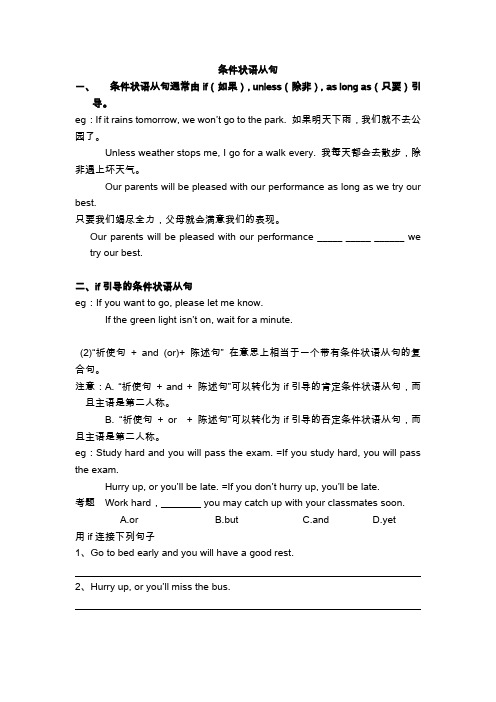
条件状语从句一、条件状语从句通常由if(如果), unless(除非),as long as(只要)引导。
eg:If it rains tomorrow, we won’t go to the park. 如果明天下雨,我们就不去公园了。
Unless weather stops me, I go for a walk every. 我每天都会去散步,除非遇上坏天气。
Our parents will be pleased with our performance as long as we try our best.只要我们竭尽全力,父母就会满意我们的表现。
Our parents will be pleased with our performance _____ _____ ______ we try our best.二、if引导的条件状语从句eg:If you want to go, please let me know.If the green light isn’t on, wait for a minute.(2)“祈使句+ and (or)+ 陈述句” 在意思上相当于一个带有条件状语从句的复合句。
注意:A. “祈使句+ and + 陈述句”可以转化为if引导的肯定条件状语从句,而且主语是第二人称。
B. “祈使句+ or + 陈述句”可以转化为if引导的否定条件状语从句,而且主语是第二人称。
eg:Study hard and you will pass the exam. =If you study hard, you will pass the exam.Hurry up, or you’ll be late. =If you don’t hurry up, you’ll be late.考题Work hard,________ you may catch up with your classmates soon.A.orB.butC.andD.yet用if连接下列句子1、Go to bed early and you will have a good rest.2、Hurry up, or you’ll miss the bus.三、if从句与主句具有以下特点:1.If从句中用一般现在时,表示未来的一种条件,从句中可以加时间状语。
新概念第二册第16课if引导的条件状语从句讲解和练习(基础题)

条件状语从句一、条件状语从句通常由if(如果), unless(除非),as long as(只要)引导。
例如:If it rains tomorrow, we won’t go to the park. 如果明天下雨,我们就不去公园了。
Unless weather stops me, I go for a walk every. 我每天都会去散步,除非遇上坏天气。
Our parents will be pleased with our performance as long as we try our best.小试牛刀:1、只要我们竭尽全力,父母就会满意我们的表现。
Our parents will be pleased with our performance _____ _____ ______ we try our best.2、如果人人为保护环境做出贡献,世界将会变得更美好。
______ ______ ______ _____ _______ to protecting the environment, the world will become much more beautiful.二、if引导的条件状语从句(1)“if从句+祈使句”的句子。
其实,if作为一个连词,主句也可以是其他形式的句子。
例如:If you want to go, please let me know.If the green light isn’t on, wait for a minute.(2)“祈使句+ and (or)+ 陈述句” 在意思上相当于一个带有条件状语从句的复合句。
注意:A. “祈使句+ and + 陈述句”可以转化为if引导的肯定条件状语从句,而且主语是第二人称。
B. “祈使句+ or + 陈述句”可以转化为if引导的否定条件状语从句,而且主语是第二人称。
例如:Study hard and you will pass the exam. =If you study hard, you will pass the exam.Hurry up, or you’ll be late. =If you don’t hurry up, you’ll be late.考题Work hard,________ you may catch up with your classmates soon.A.orB.butC.andD.yet思路解析:本句是“祈使句+and”的句型,句意为“努力学习,你会很快赶上其他同学的”,and在句中表示承接关系,所以选C项。
Unit 7单元If 和 Unless引导的条件状语从句 牛津深圳版八年级英语上册

If/Unless引导的条件状语从句【典型例句】1.If you take a fish out of water, it dies.2.If you live a healthy life, your memory will work better.3.If you forget the meaning of the word, you can look it up in the dictionary.4.Put up your hands if you have any questions.5.Unless you get enough sleep every night, you will not remember things well.一、概念“If 如果”,它引导的句子表示某事发生的条件,即“在......条件下某事才能发生”,在句子中充当状语。
二、用法(1)如果if / unless条件句讲述自然规律,肯定会发生的事情或客观事实,主句和if从句都用一般现在时态。
(主现从现)(2)在if / unless引导的条件状语从句中,谈论将来可能出现的情况时:(3) unless = if …… not…… “除非;如果不…”(4)除了if / unless引导的从句,还可由when, as soon as, not…until来引导一般将来时从句:一般现在时主句情态动词祈使句*从句和主句可互换位置If you take a fish out of water, it dies.= The fish dies if it you take it out of water. (主现从现)If you live a healthy life, your memory will work better.=Your memory will work better if you live a healthy life. (主将从现)If you forget the meaning of the word, you can look it up in the dictionary.=You can look it up if you forget the meaning of the word. (主情从现)Put up your hands if you have any questions.=If you have any questions, out up your hands. (主祈从现)Unless you get enough sleep every night, you will not remember things well.=You will not remember things well unless you get enough sleep every night.=If you don’t get enough sleep every night, you will not remember things well. Unless you get up early, you will be late.=You will be late unless you get up early.=If you don’t get up early, you will be late三、练习I.用括号内所给词的适当形式填空。
英语条件状语从句的用法总结

条件状语从句的用法总结条件状语从句就是在复合句中表示主句动作发生条件的状语从句。
引导条件状语从句最经常用的连词是if,它的意思是“如果”;除此之外,还有unless (=if…not如果不……,除非), as/so long as(只要), while(=as long as只要), supposing (that)/provided /providing (that)(假如), in case(假使), on condition that(在……的条件下)等。
它们也多少含有“如果”的意思,也可用于引导条件状语从句。
1. 用if引导:if意为“如果”。
如:You can’t take photographs if the light is bad. 光线不足,就无法拍照。
If you cheat in the exam you’ll never get away with it. 考试作弊必予追究。
2. 用unless引导:unless的意思是“如果不”“除非”。
如:Don’t act unless you’re certain. 没有把握就不要做。
Unless you go at once you will be late. 如果你不马上走,就会迟到的。
3. 用as [so] long as引导:as [so] long as的意思是“如果”“只要”。
如:I’ll remember that day as long as I live. 只要我活着,我就不会忘记那个日子。
You may take my dictionary as long as you don’t keep it too long. 只要使用时间不太长,你可以把我的词典拿去。
4. 用in case引导:in case用连词引导条件状语从句时,其意为“如果”“万一”。
如:In case I’m late, start without me. 万一我迟到,就不等我了。
【语法】M4U7-if...not,unless引导的条件状语从句
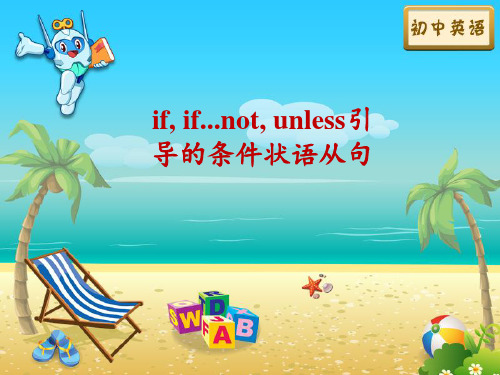
Presentation
3.主情(can,may,should,must)从现
If you feel hungry, you should eat something.
Presentation
If you feel tired, you must have a rest.
Practice
Complete these sentences with the words in the brackets.
Practice
Match.
A
B a.you will not play it well. b.if it does not rain.
1.We will have a picnic tomorrow 2.I will finish the book today 3.Unless you want to watch something, 4.I'm going to buy a dress for my mother 5.Unless you practise playing the piano everyday,
Presentation
1.用if/unless条件句表达客观真理或普 通现象 主现从现
If you drop a glass, it breaks.
Nothing is difficult if you put your heart into it.世上无难事,只怕有心人。
Presentation
If you don't get enough sleep, you will not remember things well.
Lead-in
Unless you get enough sleep, you will not remember things well.
条件状语从句连接词
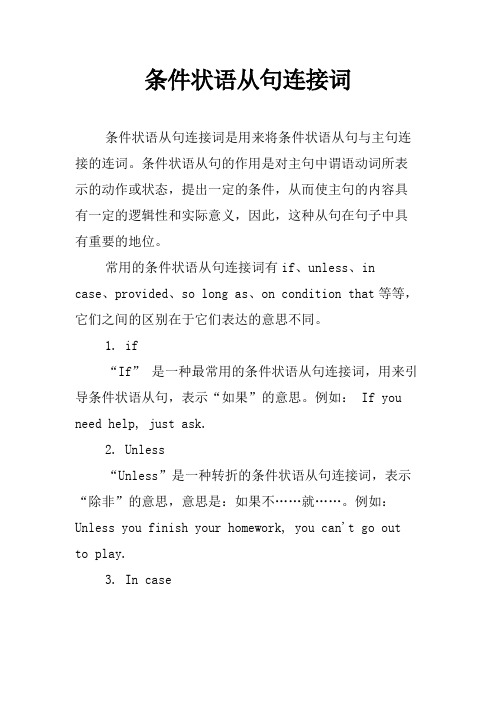
条件状语从句连接词条件状语从句连接词是用来将条件状语从句与主句连接的连词。
条件状语从句的作用是对主句中谓语动词所表示的动作或状态,提出一定的条件,从而使主句的内容具有一定的逻辑性和实际意义,因此,这种从句在句子中具有重要的地位。
常用的条件状语从句连接词有if、unless、in case、provided、so long as、on condition that等等,它们之间的区别在于它们表达的意思不同。
1. if“If” 是一种最常用的条件状语从句连接词,用来引导条件状语从句,表示“如果”的意思。
例如: If you need help, just ask.2. Unless“Unless”是一种转折的条件状语从句连接词,表示“除非”的意思,意思是:如果不……就……。
例如:Unless you finish your homework, you can't go out to play.3. In case“In case”是一种时间上有限制的条件状语从句连接词,表示“以防万一,万一”的意思,强调可能发生的情况。
例如: Take your umbrella in case it rains.4. Provided/Providing“Provided/Providing”是一种让步的条件状语从句连接词,表示“只要,前提是”的意思,意思是:只要……就……。
例如: You can use my bike provided that you take good care of it.5. So long as“So long as”也是一种让步的条件状语从句连接词,表示“只要,前提是”的意思,意思是:只要……就……。
例如: You can stay with us so long as you don't make any noise.6. On condition that“On condition that”也是一种让步的条件状语从句连接词,表示“只要,前提是”的意思,意思是:只要……就……。
条件状语从句

条件状语从句引导条件状语从句的连接词主要有:if(如果)、unless(除非)或as long as(只要)等。
unless在意思上等于if...not。
一、条件状语从句用法1、引导条件状语从句最常用的连词是if,由if引导的条件状语从句表示在某种条件下某事很可能发生。
如:If you ask him, he will help you.如果你请他帮忙,他会帮你的。
If you fail in the exam, you will let him down.如果你考试不及格,你会让他失望的。
另外,if从句还表示不可实现的条件或根本不可能存在的条件,也就是一种虚拟的条件或假设,从句多用一般过去时或过去完成时。
如: If I were you, I would invite him to the party.如果我是你,我会邀请他参加聚会。
2、unless = if...not.除非,若不,除非在……的时候例如:Let's go out for a walk unless you are too tired.=If you are not too tired, let's go out for a walk.Unless it rains, the game will be played.除非下雨,比赛将照常进行。
3、so/as long as只要例句;You may borrow my book as long as you keep it clean. 只要你保持书的清洁,你就可以把我的书借去。
So long as you’re happy, it doesn’t matter what you do. 只要你高兴,你做什么都没有关系。
二、时态问题在条件状语从句中,要注意“主将从现”的规定,即主句用一般将来时,从句用一般现在时表示将来时。
例:If it doesn’t rain tomorrow, we will go hiking.如果明天不下雨,我们就去远足。
条件状语从句的三种形式

条件状语从句的三种形式一、if引导的条件状语从句1、如果你乐意,我们可以去公园散步。
If you are willing, we can go for a walk in the park.2、如果他住得太远,他就不能每天都来上班。
If he lived too far, he couldn’t come to work every day.3、如果有机会,我真想去法国旅行。
If I have a chance, I would really like to travel to France.4、如果你想获得更好的成绩,你应该对自己更严格一些。
If you want better grades, you should be stricter with yourself.二、unless引导的条件状语从句1、除非你受邀,否则别去参加他们的派对。
Unless you are invited, don't go to their party.2、除非你有权限,否则请勿进入这一地区。
Unless you have permission, do not enter this area.3、除非你将成绩提高,否则不会被录取。
Unless you improve your grades, you will not be accepted.4、除非天气转好,否则我们就不会去公园玩耍。
Unless the weather turns better, we won't go to the park to play.三、as long as引导的条件状语从句1、只要你努力,我们就可以赢得这场比赛。
As long as you try hard, we can win the game.2、只要你坚持,你就可以完成这项任务。
As long as you persist, you can finish the task.3、只要你学习努力,你就可以获得优等奖学金。
条件状语从句时态

条件状语从句时态条件状语从句时态根据主句决定。
主句是一般将来时态,祈使句或情态动词,从句要用现在时态;主句如果是过去的某种时态,则从句要用过去的某种时态。
条件状语常用的引导词是if和unless1、用if引导:if意为如果。
例句:I donrsquo;t know if it will rain tomorrow. But if it rains tomorrow, Irsquo;ll stay at home.不知道明天是否会下雨,但要是下雨的话,我就呆在家里。
2、用unless引导:unless的意思是如果不除非。
但除了这两个以外,条件状语从句也拥有一些其他的引导词,这些引导词出现频率较低,用法偏复杂,所以不如if和unless知名度那么高。
1. on condition(that)...在条件下eg.I can tell you the truth on condition that you promise to keep a secret.You can eat ice cream on condition (that) you won#39;t eat too much.2. supposing conj.如果,假如eg.Supposing it rains,shall we continue the sports meeting?Supposing anything should go wrong,what would you do then?3. provided conj.假如,除非,以为条件provided (that) +从句表示一种假设条件。
eg. He will sign the contract provided we offer more favorable terms.He won#39;t be against us in the meeting provided that we ask for his advice in advance.4.but for 若非,要不是eg.But for the rain,we should have a pleasant journey.But for your help,we should not have finished in time.5. in case 如果,万一eg.In case I forget, please remind me about it.6. as/so long as 只要eg.As long as yoursquo;re happy,it doesnrsquo;t matter what you do.As long as it doesn#39;t rain, we can go.。
unless,if,as long as引导的条件状语从句
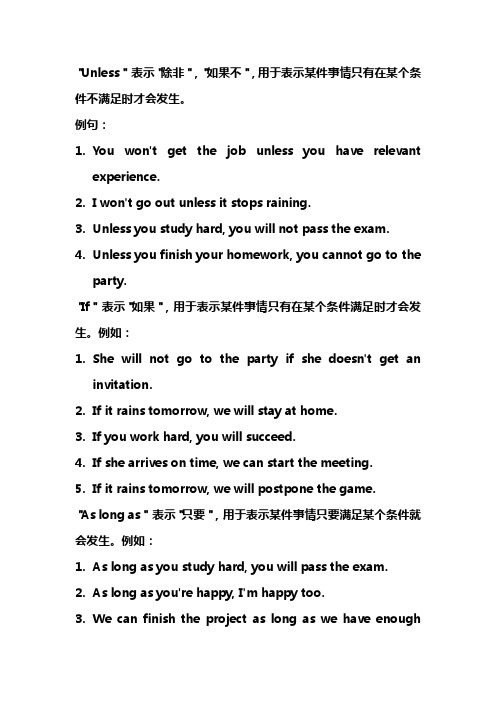
"Unless" 表示"除非","如果不",用于表示某件事情只有在某个条件不满足时才会发生。
例句:1.You won't get the job unless you have relevantexperience.2.I won't go out unless it stops raining.3.Unless you study hard, you will not pass the exam.4.Unless you finish your homework, you cannot go to theparty."If" 表示"如果",用于表示某件事情只有在某个条件满足时才会发生。
例如:1.She will not go to the party if she doesn't get aninvitation.2.If it rains tomorrow, we will stay at home.3.If you work hard, you will succeed.4.If she arrives on time, we can start the meeting.5.If it rains tomorrow, we will postpone the game."As long as" 表示"只要",用于表示某件事情只要满足某个条件就会发生。
例如:1.As long as you study hard, you will pass the exam.2.As long as you're happy, I'm happy too.3.We can finish the project as long as we have enoughresources.4.As long as you are happy, I don't care about anythingelse.5.As long as you work hard, you will achieve your goals.。
由if和unless引导的条件状语从句

由if 和unless 引导的条件状语从句1. If we lose our short-term memory, we forget things happeningrecently.译:______________________________________________________2. If the picture is silly, strange and colorful, you will remember itbetter.译:______________________________________________________A: If sentences: actions with definite results. 有必然结果发生的行动eg: ①If you go into a clothes shop, you find clothes.②If you go into a car showroom, you see cars.③Water turns into ice if you cool it.④The wood floats if you put it into water.Conclusion:1). 如果 if 条件句谈论的是重复发生和预示必定要发生的情景和事件,则主从句大多用一般现在时态。
2). 在if 条件句中,if 条件从句可以放在前面,也可以放在后面。
当if 引导的条件从句放在前面时,后面常用逗号隔开。
B: If sentences: actions with possible results. 有可能性结果发生的行动eg: If you ask him,he will help you.如果你请他帮忙,他会帮你的。
If you fail in the exam,you will let him down.在 if 引导的条件状语从句中,如果从句谈论的是一个有可能发生的事实及其产生的相关的结果,主句用一般将来时态,从句用一般现在时态。
条件状语从句英语语法大全

条件状语从句由引导词if或unless引导的状语从句叫做条件状语从句。
例如:1.If it doesn’t rain tomorrow, we will go hiking.如果明天不下雨, 我们就去远足.2.You will get good grades if you study hard.如果你努力学习,就会取得好成绩.3.I will go to the party unless he goes there too.我不会去参加聚会的, 除非他也去.(如果他不去,我也不去.)4.You will be late unless you leave immediately.如果你不马上走,你将会迟到的.(=If you don’t leave immediately, you will be late.)在英文中,条件是指某一件事情实现之后(状语从句中的动作),其它事情(主句中的动作)才能发生,通常译作“假如”。
注意:在含有条件状语从句的复合句中,表示将来时态,主句是一般将来时态,从句要用一般现在时,祈使句或情态动词[主将从现原则](主将从现,将并非指将来时,还只表示将来含义的,跟着if后的那句话是从句。
条件状语从句类型语法引导条件状语从句最常用的连词是if,由if引导的条件状语从句表示在某种条件下某事很可能发生。
如:1)If you ask him, he will help you.如果你请他帮忙,他会帮你的。
2)If you fail in the exam, you will let him down.如果你考试不及格,你会让他失望的if引导的条件状语从句既可以将从句放前面也可以将从句放后面(如果天下雨,我们就不玩了)If it rains, we will stop playing.‘转为We will stop playing if it rains.另外,if从句还表示不可实现的条件或根本不可能存在的条件,也就是一种虚拟的条件或假设,从句多用一般过去时或过去完成时。
条件状语从句

1.概念定义由引导词if或unless引导的状语从句叫做条件状语从句。
在英文中,条件是指某一件事情实现之后(状语从句中的动作),其它事情(主句中的动作)才能发生,通常译作“假如”。
注意:在含有条件状语从句的复合句中,表示将来时态,主句是一般将来时态,祈使句或情态动词,从句要用现在时态,[主将从现原则](主将从现,将并非指将来时,还指表示将来含义的,跟着if后的那句话是从句。
)2.类型语法引导条件状语从句最常用的连词是if,由if引导的条件状语从句表示在某种条件下某事很可能发生。
如:1)If you ask him,he will help you.如果你请他帮忙,他会帮你的。
2)If you fail in the exam,you will let him down.如果你考试不及格,你会让他失望的if引导的条件状语从句既可以将从句放前面也可以将从句放后面(如果天下雨,我们就不玩了)If it rains,we will stop playing.‘转为We will stop playing if it rains.另外,if从句还表示不可实现的条件或根本不可能存在的条件,也就是一种虚拟的条件或假设,从句多用一般过去时或过去完成时。
如:If I were you,I would invite him to the party.如果我是你,我会邀请他参加聚会。
I would have arrived much earlier if I had not been caught in the traffic.如果没有堵车,我会到的早一点儿。
那么,除了if之外,是否还有其他连词也可以引导条件状语从句呢?回答是肯定的,不仅有,还有很多。
这些词由于出现的频率较小,且用法较复杂一些,所以不如if为大家所熟知罢了。
下面就这些词的用法以例句的形式进行一下简单总结。
1、unless conj.除非,若不,除非在……的时候You will fail to arrive there in time unless you start earlier.如果你不早点动身,你就不能及时赶到那儿。
- 1、下载文档前请自行甄别文档内容的完整性,平台不提供额外的编辑、内容补充、找答案等附加服务。
- 2、"仅部分预览"的文档,不可在线预览部分如存在完整性等问题,可反馈申请退款(可完整预览的文档不适用该条件!)。
- 3、如文档侵犯您的权益,请联系客服反馈,我们会尽快为您处理(人工客服工作时间:9:00-18:30)。
1. If we lose our short-term memory, we forget things happening recently.译:2. If the picture is silly, strange and colorful, you will remember it better. 译:A: If sentences: actions with definite results.有必然结果发生的行动eg:① If you go into a clothes shop, you find clothes.②If you go into a car showroom, you see cars.③Water turns into ice if you cool it.④The wood floats if you put it into water.Conclusion:1) . 如果if 条件句谈论的是重复发生和预示必定要发生的情景和事件,则主从句大多用一般现在时态。
2) . 在if 条件句中,if 条件从句可以放在前面,也可以放在后面。
当if 引导的条件从句放在前面时,后面常用逗号隔开。
B: If sentences: actions with possible results 有可能性结果发生的行动eg: If you ask him,he will help you.如果你请他帮忙,他会帮你的。
If you fail in the exam,you will let him down.在if 引导的条件状语从句中,如果从句谈论的是一个有可能发生的事实及其产生的相关的结果,主句用一般将来时态,从句用一般现在时态。
C: unless引导的条件状语从句:unless= if ......... not. con除非,若不,除非•••(否则)e.g.: Let's go out for a walk unless you are too tired.= If you are not too tied, let's go out for a walk. 我们出去散步吧,除非是你太累。
译:如果你不早点出发,你就不能及时赶到那儿。
我们可以把unless或if…not从句放在句子开头或末尾。
You will be late for school unless you leave now. = Unless you leave now, you will be late for school. 除非你早点出发,(否则)你上学会迟到。
You will be late for school if you don 't leave now. =If you don ' t leave now, you will be late for schoo如果你不早点出发,你上学迟1. If we lose our short-term memory, we forget things happening recently.译:到。
“if引导的条件状语从句的用法,现在总结一下:1) 引导条件状语从句最常用的连词是if o if引导的条件句有真实条件句和非真实条件句两种(非真实条件句会在以后的虚拟语气中阐述),其引导的真实条件状语从句表示在某种条件下某事很可能发生。
2) if条件句不一般,几个要点记心间;条件句,放在前,逗号要放句中间。
条件句表可能,主句多用将来时;条件句表事实,主句常用现在时。
【巩固练习】一.if和uni ess句型互改。
Eg: You will fail the exam if you don ' t work hard.=You will fail the exam uni ess you work hard.1) Uni ess you obey the rules, you will be puni shed.2) A fish dies if you don ' t keep it in the water.3) No body can learn English well if he doesn ' t work hard on it.4) Un less you start right now, you will be late for the meet ing.二.用if 或uni ess 填空。
1. ________ you put wood into water, it floats.2. I sleep with the window open ________ it is really cold.3. You will not improve your skill in a short time __ you practice playi ng the violin regularly.4. Ice melts __________ you heat it.5. ______ you boil water, it becomes steam (蒸汽).6. ______ you don ' t work hard, you will fail the exam.7. He can ' t be here on time _____ he gets up early.8. ______ you don ' t have eno ugh sleep, you will feel tired.9. ______ it is fine tomorrow, I will go fishing with my dad.10. _____ you finish your homework, you will not go out to play.三.单项选择。
1. You will not remember the facts ______ you understand them well.A. ifB. uni essC. if notD. because2. Shenzhen ______ a dirty place if we ______ the ground.A. is; litterB. will be; will litterC. is; are litteri ngD. will be; litter3. If you ______ harder, you will fail the exam.A. not workB. workC. don ' t workD. won ' t work4. _____ you obey the rules, you will be punished.A. IfB. SinceC. BecauseD. Uni ess5. He can ' t see the words on the board uni ess he his glasses.A. wearB. wearsC. doesn ' t wearD. to wear6. If you pla nt seeds in soil, _____ .A. it growsB. they growC. you growD. it will grow7. If you check your timetable every night, it _____ in your mind better.A. will stayB. stayC. stayedD. stayi ng8. A tourist will easily lose his way in Beiji ng ____ he has a map or guide.A. if B, because C. uni ess D. whe n9. I shall teleph one the police and compla in about it ____ t he no iseA. if, stopsB. uni ess, stops10. I sleep with the window open ______ it A. if B. if not 11. _____ y ou try, you will n ever succeed. A. If B. U ntil C. Since12. _____ h e doesn ' t come on time, wgowiMthout him.A. IfB. U nlessC. When13. I will come to see you if it _____ rain tomorrow morni ng.A. won ' tB. didn 'tC. doesn 't14. If you take a fish out of the water, it _____ .A. dieB. diesC. will die15. ---Shall Tony come and play computer games?---No, _____ he has fini shed his homework.A. whe nB. ifC. uni ess C. if not, stopss really cold.C. uni essD. uni ess, stop D. until D. Un less D. Because D. don 't D. has diedD. once。
